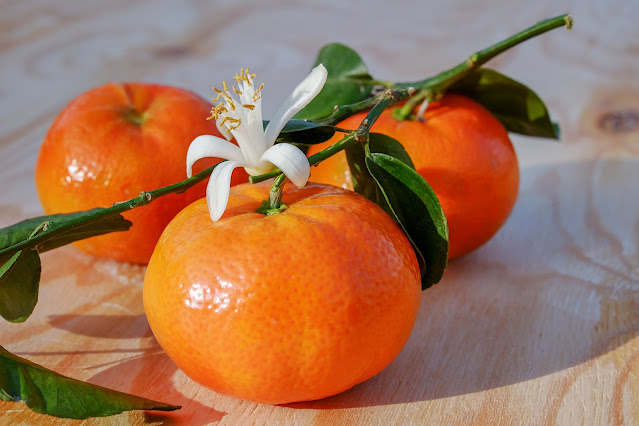How Many Calories In A Clementine
How Many Calories Are In A Clementine?
Clementines are a type of small, sweet citrus fruit that are similar to oranges, but have a slightly tangier taste. They are a hybrid of a mandarin orange and a sweet orange and are typically seedless. They are also known for their thin, easy-to-peel skin, which makes them a popular choice for snacking. Clementines are in season during the winter months, and are often sold in small boxes or bags as a convenient and easy-to-eat fruit. They are a great source of nutrients like vitamin C as well as other necessary ones.
The scientific name for the clementine fruit is Citrus clementina. It is a cross between a sweet orange and just a mandarin orange. The family of Clementine is Rutaceae, which is a large plant family that includes many other citrus fruits such as oranges, lemons, limes, and grapefruits. The family also includes many other plants such as rue, citrus, and bergamot.
Where Do Clementines Grow?
Clementines are typically grown in Mediterranean regions with a warm climate and ample sunlight. They are particularly popular in Spain, Italy, and Morocco. Spain is the biggest producer of clementines in the world. Clementines are also grown in California, Florida, and in some parts of South Africa and Chile. Clementines are a type of citrus fruit, they prefer well-drained soils and grow well in areas with mild winters and hot summers.
When Are Clementines In Season?
Clementines, also known as "Christmas oranges," are a type of mandarin orange that are known for their easy-to-peel skin and sweet, juicy flesh. They are a popular winter fruit, and typically peak in December, which is why they are sometimes referred to as "Christmas oranges." However, the exact time of the season may change based on the surroundings and weather. For example, clementines grown in California may have a slightly different season than those grown in Florida.
Additionally, some varieties of clementines are harvested earlier or later than others, so the availability of specific types of clementines may also vary. In general, clementines are in season from November to January, but it's always best to check with your local growers to find out when they will have the freshest and best quality fruits available.
Clementines Nutrition Info | How Many Calories Are In A Clementine?
Clementines weigh 100 grammes and have the following nutrients:
- 47 calories
- 11.8 grams of carbohydrates (primarily in the form of natural sugar)
- 1 gram of protein
- 0.7 grams of fiber
- 0.1 grams of fat
- 53.7 milligrams of vitamin C, which is about 90% of the recommended daily intake
- 0.1 milligrams of thiamine
- 0.06 milligrams of riboflavin
- 0.5 milligrams of niacin
- 0.1 milligrams of vitamin B6
- 0.1 milligrams of folate
- 0.03 milligrams of vitamin E
- 1.1 milligrams of vitamin K
- 23 milligrams of calcium
- 0.2 milligrams of iron
- 16 milligrams of magnesium
- 0.1 milligrams of zinc
- 7 milligrams of phosphorus
- 32 milligrams of potassium.
As you can see clementine fruits are a great source of Vitamin C and other essential vitamins and minerals for a healthy diet.
Clementine Vs Orange Vs mandarin
Clementines, oranges, and mandarins are all types of citrus fruits, but they have some distinct differences.
- Clementines are a combination of the sweet and mandarin oranges.. They are small, seedless, and have a thin, easy-to-peel skin. They are also sweeter and less acidic than oranges and mandarins. Winter is the time of year when clementines are in availability.
- Oranges are a larger citrus fruit that can be divided into two main categories: sweet and bitter. The sweet oranges are typically eaten as a fruit, while the bitter oranges are used to make marmalade and other preserves. The skin of the orange is thick and harder to peel. Winter and the initial stages of spring are orange season.
- Mandarins are a small citrus fruit that is similar to an orange but with a slightly sweeter taste and a more delicate texture. They are also easy to peel and are often seedless. They are in harvest in the winter.
Overall, Clementine is a sweeter and less acidic version of mandarin, and smaller than oranges.
Are Clementines Better Than Oranges? Which Is Healthier Oranges Or Clementines?
It depends on personal preference. Both clementines and oranges have their own unique characteristics and nutritional benefits. Clementines are smaller, sweeter, and less acidic than oranges and are also seedless and have a thinner, easier-to-peel skin. Oranges are larger, have thicker skin that's harder to peel, but they have a more complex flavor, a mix of sweet and tangy. Oranges also have a bit more fiber compared to Clementines.
Nutritionally, both fruits are good sources of vitamin C and other essential vitamins and minerals, which are important for maintaining a healthy diet. Both fruits also have similar nutritional value.
In summary, both clementines and oranges are healthy fruits that offer many nutritional benefits. Personal taste will determine which is "greater" than the other. You can enjoy both fruits and switch between them for variety.
Are Mandarins The Same As Clementines?
Mandarins and clementines are both types of citrus fruit that are similar in appearance and taste. They are both small and easy to peel, with a thin, smooth skin and a sweet, juicy flesh. However, mandarins and clementines are different varieties of fruit. Clementines are a hybrid between a mandarin orange and a sweet orange, while mandarins are a group of small citrus fruits that include tangerines, satsumas, and tangelos. In general, mandarins have a slightly more complex flavor and a less acidic taste than clementines.
How Many Clementines Can I Eat A Day?
The recommended daily intake of fruits and vegetables varies based on an individual's age, sex, and level of physical activity. As a general guideline, most adults should aim to eat at least 1.5 to 2 cups of fruit per day.
A single clementine is a serving of fruit, so you could eat one or two clementines a day as part of a healthy diet. Eating too much of anything can be harmful, so it's important to be mindful of your overall calorie and nutrient intake.
It's also important to note that while clementines are a healthy food, they do contain natural sugars, so it's best to consume them in moderation if you're trying to limit your sugar intake. Eating a balanced diet with a variety of fruits, vegetables, whole grains, lean proteins, and healthy fats is the best way to ensure that you're getting all the nutrients you need for optimal health.
Clementine Health Benefits & Side Effects Of Eating
Clementines have many health benefits, as they are a good source of vitamin C and other essential vitamins and minerals. Some of the potential health benefits of clementines include:
- Boosting immunity: Clementines are a rich source of Vitamin C which is known to boost the immune system and help fight off infections and illnesses.
- Lowering blood pressure: The potassium in clementines can help lower blood pressure and reduce the risk of stroke and heart disease.
- Preventing cancer: The high levels of antioxidants in clementines may help protect against cancer and other chronic diseases.
- Aiding digestion: The fiber in clementines can help regulate digestion and prevent constipation.
- Improving skin health: Vitamin C in Clementines is known to boost collagen production, which can help improve the appearance of the skin and reduce the signs of aging.
However, it's important to note that eating too many clementines can have negative effects on the body, such as:
- Over consumption of sugar and calories
- Digestive problems like gas and bloating
- Interaction with certain medications or supplements
It's always best to consume fruits in moderation as a part of a balanced diet, and if you have any specific health concerns, it's always best to consult with a healthcare professional.
Benefits Of Eating Clementines Everyday For Skin
Eating clementines (a type of mandarin orange) everyday can provide several benefits for the skin. Some of these benefits include:
- High Vitamin C content: Clementines are a good source of Vitamin C, which is essential for collagen production. A protein called collagen helps to maintain the skin supple and firm.
- Antioxidants: Clementines also contain antioxidants that can help protect the skin from damage caused by free radicals.
- Hydration: Clementines are high in water content, which can help keep the skin hydrated and plump.
- Anti-inflammatory properties: Clementines may also have anti-inflammatory properties that can help reduce inflammation and redness in the skin.
- Aiding in digestion: Eating Clementine can also help with digestion, which is important for healthy skin.
It's worth mentioning that eating a balanced diet and drinking plenty of water is essential for maintaining healthy skin. Eating clementines as a part of a balanced diet can help provide some additional benefits
Are Clementines Good For Acne?
Clementines, like other citrus fruits, contain high levels of vitamin C which is beneficial for the skin. Vitamin C can help to boost collagen production and improve the skin's elasticity, which can in turn reduce the appearance of acne. Additionally, vitamin C acts as an antioxidant, helping to protect the skin from damage caused by free radicals, which can contribute to the development of acne.
However, it is worth noting that while eating clementines or other citrus fruits can provide some benefits for the skin, it is not a replacement for a proper skincare routine or medical treatment for acne. Clearing up acne requires a combination of a healthy diet, good hygiene, and a skincare routine that includes ingredients known to be effective against acne such as salicylic acid, retinoids, benzoyl peroxide, etc.
It's also important to note that citrus fruits like clementines, lemons, and oranges can be acidic and may cause skin irritation for people with sensitive skin, so it's best to test a small area of skin before consuming excessive amount.
Are Clementines Good For Your Hair?
Clementines, like other citrus fruits, contain high levels of vitamin C which can be beneficial for the hair. Vitamin C plays an important role in the production of collagen, which helps to support the hair's structure. Additionally, vitamin C can help to improve the absorption of iron, which is essential for hair growth.
However, it's worth noting that while eating clementines or other citrus fruits can provide some benefits for the hair, it's not a replacement for a proper hair care routine or medical treatment for hair problems. Hair growth and health depends on various factors such as genetics, diet, and hair care habits, and consuming clementines alone may not be enough to see significant changes in your hair.
It's also important to note that excessive consumption of citrus fruits, including clementines, can lead to dry and brittle hair due to the high acidity. Additionally, if you have dry, sensitive or damaged hair, excessive consumption of citrus fruits can cause more harm than good, so it's best to consume them in moderation.
Does Clementines Support To Clean Dandruff?
Clementines, like other citrus fruits, contain high levels of vitamin C which can be beneficial for the hair. However, the consumption of Clementines alone may not be enough to clean dandruff. Dandruff is a common scalp condition caused by a variety of factors, including dry skin, yeast overgrowth, and sensitivity to hair care products.
A healthy diet that includes a variety of fruits and vegetables, including clementines, can support overall health and well-being, which can in turn benefit the hair and scalp. However, it is not a direct treatment for dandruff.
If you are experiencing dandruff, it's recommended to see a dermatologist or hair care professional for an accurate diagnosis and appropriate treatment. They may recommend a medicated shampoo, a change in hair care routine or other products containing active ingredients such as salicylic acid, coal tar, or tea tree oil that are known to be effective against dandruff.
It's also important to keep in mind that citrus fruits like clementines, lemons, and oranges can be acidic, and consuming excessive amounts can lead to dryness and irritation of the scalp. Therefore, it's best to consume them in moderation and always patch test if you're going to use them as a hair care ingredient.
Are Clementines Good For Weight Loss or Belly fat?
Clementines can be a part of a weight loss diet because they are low in calories and high in fiber, which can help to keep you feeling full and satisfied. Additionally, they are a good source of vitamin C and other vitamins and minerals that support overall health.
Eating a diet that is rich in fruits and vegetables, including clementines, can help to promote weight loss by providing the body with essential nutrients while keeping calorie intake low. However, it's important to note that weight loss is a complex process that depends on many factors including, calorie intake, physical activity, and genetics, so it's not just about eating Clementines or any other single food.
As for belly fat, it's worth noting that spot reduction (losing fat in a specific area of the body) is not possible. Losing weight in general will help you to lose fat all over your body, including the belly. The best way to target belly fat is through a combination of a healthy diet, regular exercise, and overall calorie deficit.
In addition, when it comes to weight loss, it's important to focus on long-term sustainable habits rather than quick fixes. This includes making healthy food choices, practicing portion control, and incorporating regular physical activity into your routine.
Are Clementines Good For Diabetics?
Clementines can be a part of a healthy diet for people with diabetes. They are low in calories and high in fiber, which can help to keep blood sugar levels stable. Additionally, they are a good source of vitamin C and other vitamins and minerals that support overall health.
However, it is important for people with diabetes to monitor their intake of fruits, as they do contain natural sugars. It is preferable to include them in a balanced diet and eat them in moderation. It's also important to note that the American Diabetes Association (ADA) recommends that fruits should be eaten in the context of mixed meals, rather than as a standalone snack or in large amounts, to minimize the impact on blood glucose levels.
Individuals with diabetes should work with a registered dietitian or a certified diabetes educator to develop a meal plan that fits their unique needs and goals. They can also monitor their blood sugar levels and adjust their diet and/or medication as needed.
It's also important for diabetics to maintain a healthy weight, engage in regular physical activity, and not smoke or drink excessively, as these are also important risk factors for diabetes and its complications.
Can You Eat Too Many Clementines While Pregnant?
Eating clementines while pregnant can be a healthy and nutritious choice, as they are a good source of vitamin C and other vitamins and minerals that are important for both mother and baby. However, it's important to consume them in moderation and as part of a balanced diet, as consuming too many clementines can have negative effects on your health.
Excessive consumption of clementines or any other citrus fruits can cause heartburn or acid reflux, which are common during pregnancy. Additionally, consuming excessive amount of citrus fruits can cause diarrhea, stomach cramps, and other digestive issues.
It's also important to note that citrus fruits can increase the risk of skin irritation and sensitivity. Therefore, it's best to test a small area of skin before consuming excessive amount, especially if you have sensitive skin.
It's recommended to consult with your healthcare provider, who will give you more specific advice based on your individual needs and circumstances.
Eating a balanced diet and taking prenatal vitamins as directed by your healthcare provider, will help ensure that you and your baby get all the nutrients you need.
Does Clementines Good For Keto?
Clementines can be included in a ketogenic diet, as they are relatively low in carbs and high in fiber. However, it's important to keep in mind that the ketogenic diet is a high-fat, moderate-protein, and very low-carbohydrate diet, and therefore it's important to carefully monitor the carbohydrate intake.
A single clementine contains about 9-12g of carbs which is a considerable amount if you're in a very low carb diet. Therefore, it's important to consider the number of clementines you're consuming in relation to your overall carbohydrate intake for the day.
It's recommended to consult with a healthcare professional or a registered dietitian before starting the ketogenic diet, as it may not be appropriate or safe for everyone and it may require close monitoring of macro nutrient intake, blood sugar and ketone levels.
As a general rule, it's best to consume a variety of nutrient-dense, low-carbohydrate foods while following a ketogenic diet, such as non-starchy vegetables, healthy fats, and moderate amounts of protein.
Does Clementine Good For Cold?
Clementines are a good source of vitamin C, which is an antioxidant that helps to boost the immune system and may help to reduce the severity and duration of cold symptoms. Eating a clementine a day can help to increase your vitamin C intake and may help to prevent colds.
Vitamin C is also important for collagen production and the health of skin, blood vessels, and bones. Moreover, it acts as an antioxidant and may help to protect the body from harmful molecules called free radicals.
It's worth noting that although vitamin C can help to reduce the severity and duration of cold symptoms, it is not a cure for the common cold, and it's not effective in preventing colds completely.
It's also important to note that excessive consumption of clementines or other citrus fruits can lead to heartburn or acid reflux, which are common during a cold. Therefore, it's best to consume them in moderation and as part of a balanced diet.
It's always a good idea to consult with a healthcare professional if you have any concern regarding your health during cold or flu. They will give you more specific advice based on your individual needs and circumstances.
How Long Do Clementines Last In The Fridge?
Clementines, also known as mandarin oranges, can last in the refrigerator for up to 2 weeks. It's important to store them in a cool, dry place and keep them in a perforated plastic bag to maintain their freshness. Before eating or using them, be sure to check for any signs of mold or spoilage.
Can Dogs Eat Clementines?
Clementines, also known as mandarins, are a type of small citrus fruit that are generally safe for dogs to eat in small amounts. However, it is important to note that the peel, leaves, and stem of the fruit contain essential oils that can be toxic to dogs if ingested in large quantities. It's best to remove the peel and give the fleshy part of the fruit to your dog.
Also, like any other fruit, it should be offered in moderation and as a treat, not as a regular part of their diet. Dogs have a different digestive system than humans and too much fruit can cause digestive upset such as diarrhea and gas.
It's always best to consult with your veterinarian before introducing new foods to your dog's diet, especially if they have any health issues or food allergies.
Conclusion
In conclusion, clementines are a healthy and delicious addition to your diet. They are low in calories, high in vitamin C, and contain other essential vitamins and minerals such as folate and potassium. Eating clementines regularly can help boost your immune system, promote healthy skin, and support heart health. Additionally, their high fiber content can aid in digestion and weight management. While they can be enjoyed in moderation as part of a balanced diet, it's always best to speak with a healthcare professional before making any major changes to your diet or supplement regimen. Keep in mind that it's important to remove the peel and give only the fleshy part of the fruit to your dog.








